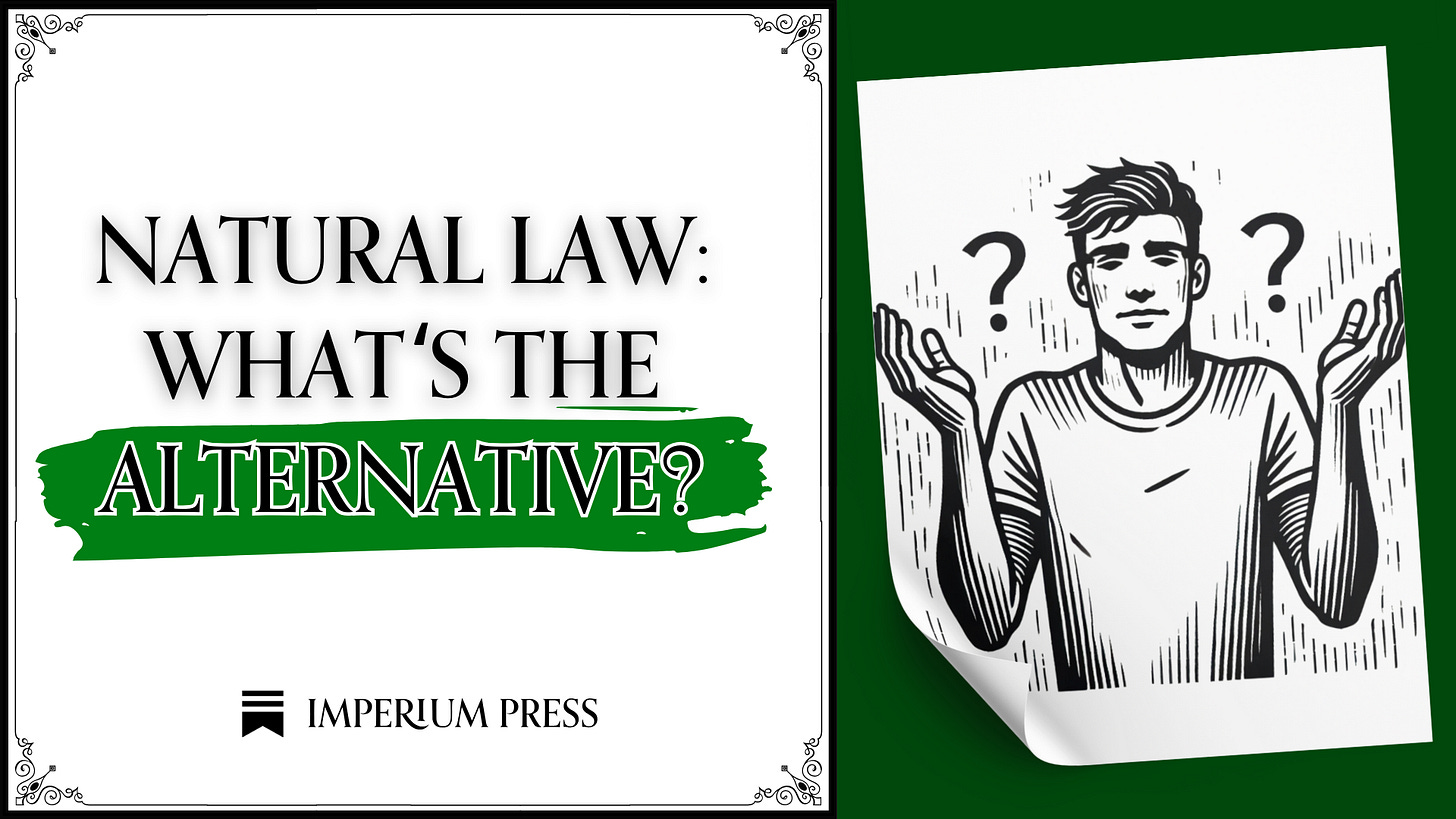If you prefer the audio of this article, click here.
Introduction
I knew our last article on natural law was going to be controversial—I just didn’t know how controversial. After too many hours of debate sparked across many private chats, I’ve decided to kick the hornet’s nest once again. The question raised over and over again was this—is there even an alternative to natural law?
There are some assumptions just below the surface, by virtue of just asking that question, that are worth drawing out. The first is that natural law is so self-evident that its absence is unthinkable. You can ask “what’s the alternative to vanilla ice cream”, but not “what’s the alternative to eating food”. Another assumption somewhat in tension with this first, is that the only alternative to natural law is a kind of mouthbreathing semi-consciousness, as though natural law is synonymous with reason or even just “thinking” at all. Our historical case against natural law reveals this tension with the “no alternative” assumption. The historical record shows that there is an alternative, that high civilizations not only existed, but flourished without natural law. So the alternative to natural law is not only thinkable, but perhaps even foundational.
What is Natural Law?
We must then turn to the question of what natural law is. In our survey in the last article, this question was answered historically. Natural law is born out of the ius gentium or “law of nations”, a kind of ad hoc international law, and grows via a schizoid mythologizing into the primitive law of all peoples, universally valid in all times and places. But that was a historical answer. Today it means many things to many people. To the Catholic it means one thing; to the Kantian it means another; to the sociologist yet another; to the post-Nuremberg regime still another. We need to be more precise than “the law of nature”.
The first thing to notice is that the term “law” is already a problem. If we turn to legal scholar W. E. Hearn for an account of law, we find straightforwardly that:
Law, then, is a species of command or signification of desire. This species has three leading characteristics. First, the command prescribes a course of conduct, and not an isolated act or forbearance; and that, not in one person or a few persons, but in all the members of a certain class. Secondly, the command implies its enforcement by means, in the last resort, of the physical force which the person who issues the command can bring to bear. Thirdly, the command proceeds from the governing body; or, as it is usually called, the sovereign; or, as I prefer to designate it, the political organ of the community.1
Law is a command of the sovereign, an indication of the sovereign’s will, the opposition to which carries with it a punishment. In a word, a law is a prescription.
Natural laws in the sense of Newtonian “laws” or the “laws” of logic are not prescriptions, they are descriptions. This is not hair-splitting—it is conceptual confusion at the level of foundations, and carries with it foundational errors. A description can be true or false; a prescription cannot—the two are essentially different kinds of utterance. What’s more, no number nor combination of descriptions alone can ever give you even the simplest prescription—this is Hume’s observation that you can’t get an ought from an is.
Most importantly for our present purpose, descriptions do not indicate any sort of will. Newton’s laws do not of themselves indicate any intelligence, desire, purpose, or goal. And now we are in a position to define natural law, what lies behind the distinct formulations of the Catholic, the liberal, the globalist, and others. Natural law is simply impersonal law over personal law. It is imperatives from no one, as opposed to imperatives from someone. At best, natural “law” is a bad analogy.
This is crucial. To understand law is to understand law as prescription. To understand prescription is to understand prescription as articulated will. And will is always the will of someone. So where a supposed “law” issues “from no one”, you can be sure that the law articulates nothing more than the will of the person arguing for it. Natural law turns out to be an infinitely malleable tool to rationalize each individual’s already existing desires. Natural law can produce a cogent argument both against homosexuality (as “unnatural”) and for homosexuality (as an expression of “autonomy”). Natural law prescribes nothing, forbids nothing. So we must then turn to some other source to arbitrate.
Divine and Natural Law
Natural law means that prescriptions are issued impersonally, out of no intelligence whatsoever, from nature. This is untenable, as Catholics and others understand. In order to produce a serious account of morality, we are then presented with two basic options: prescriptions come either a) from human beings themselves, or b) from divinity. The humanist opts for the former; the religious defender of natural law opts for the latter.
The religious perspective understands that a prescription—the basic form of any “ought” or morality—can be traced back ultimately to a will. Within a monotheistic framework, we can assume that the will which lies at the bottom of all prescription is the will of the creator god. This is what Christians seem to mean when they say that without God, nothing can be right or wrong. A proper monotheistic perspective would be that natural law articulates the will of the creator.
But this spells trouble for natural law. After all, the articulated will of the god is simply divine law—what need, then, do we have of natural law? Why have two terms to describe exactly the same thing?
This is why religious people who affirm natural law struggle to make a meaningful distinction between divine and natural law. It’s not enough to say that natural law is “the articulated divine law inherent in human nature”. This is a difference without a distinction. Natural law is still redundant, because human nature is determined by divine law, and natural law simply cashes out to divine law.
The very nature of law is that it is decisionist—no lawgiver will brook a law that contradicts his own. So is the natural law subordinate to divine law? If so, why do we need a “natural law” at all? Is divine law bound by natural law? If so, in what sense is the creator god sovereign?
Asked a different way, can the sovereign creator god reverse his prescriptions? Can the creator god now declare that homosexuality is lawful, that the child should rule the father, that the brother must marry the sister? Again, it is not enough to say that the will of the god is simply identical with an abstract good, and so the creator cannot will what is not good. This doesn’t even address the problem, which is to ask, between god and good, which determines which? So which is sovereign? Divine or natural law? We are back to the Euthyphro dilemma—either impersonal law bounds the personal, or the personal law determines the impersonal.
The solution to the Euthyphro dilemma is not hard. You come down on one side or another and accept the consequences. On the one hand, you come down on the side of impersonal law, in which case you are an atheist, you do not understand what law is in its essence, and you thereby destroy the possibility of law. On the other, you come down on the side of personal law in which case you admit that good is at bottom incomprehensible and irrational. For the truly religious person, that is not a problem. The high god’s commands are inscrutable and mysterious. Is that a problem? If so, it is a problem for you, not for the high god.
Natural Law and Paganism
Part of the problem with natural law is that it’s so ambiguous. It differs depending on who you ask, unlike divine law which is objective and requires a minimum of interpretation, as commands are often issued by the high god unambiguously. It’s not that natural law “requires work” or demands a kind of spiritual and moral maturity. When we understand what law actually is—voluntaristic and bound up with will—we see clearly that it is impossible to agree on impersonal law even in principle. The effect of natural law is to enshrine individualism and to corrode asabiyyah. This is also why the staunchest defenders of it, at least within paganism, are Ragnar Redbeard types, the less nuanced of whom are basically just libertarians. Natural law tends to appeal to the herd of cats, each of whom can have his own special interpretation for his own special self.
But isn’t natural law traditional? After all, Germanic paganism has ørlog, the “ur-law”, by which even the gods themselves are bound. This certainly requires an explanation.





